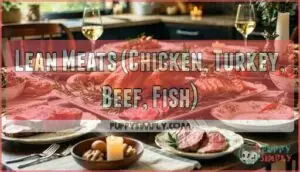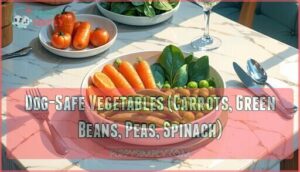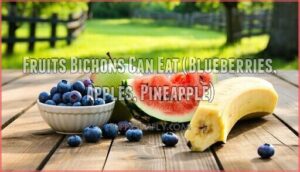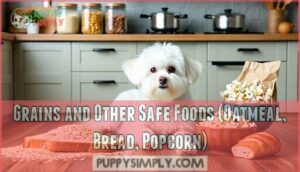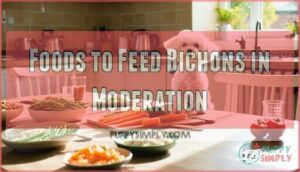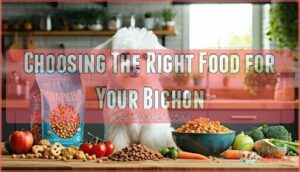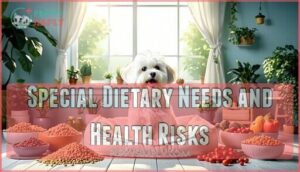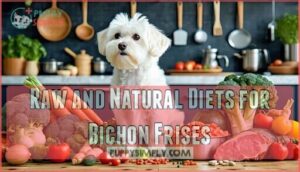This site is supported by our readers. We may earn a commission, at no cost to you, if you purchase through links.

While Bichons can enjoy many wholesome foods that complement their diet, certain items—like grapes, chocolate, and onions—pose serious health risks that can lead to kidney failure, toxicity, or anemia.
Understanding which foods support your Bichon’s health and which ones threaten it isn’t just helpful; it’s essential for preventing emergency vet visits and keeping your dog thriving for years to come.
Table Of Contents
- Key Takeaways
- What Makes Bichon Frises Unique?
- Essential Nutrition for Bichon Frises
- Safe Foods for Bichon Frises
- Foods Bichon Frises Must Avoid
- Foods to Feed Bichons in Moderation
- Choosing The Right Food for Your Bichon
- Special Dietary Needs and Health Risks
- Raw and Natural Diets for Bichon Frises
- Frequently Asked Questions (FAQs)
- What foods are bichons allergic to?
- What food can Bichon Frise eat?
- Can Bichon Frise eat cheese?
- Can Bichon Frise eat scrambled eggs?
- What can a Bichon Frise not eat?
- What can Bichon Frisé eat?
- Can Bichon Frises eat wet or dry food?
- Can a Bichon Frise be fed puppy food?
- How do Bichons Frises respond to dietary changes?
- What are common symptoms of food allergies in Bichons?
- Conclusion
Key Takeaways
- Bichon Frises need 296-663 calories daily depending on age and activity level, with high-quality protein from lean meats, safe vegetables like carrots and green beans, and fruits like blueberries forming the foundation of their diet.
- Toxic foods including grapes, raisins, chocolate, onions, garlic, xylitol, and macadamia nuts can cause severe health emergencies ranging from kidney failure to liver damage, even in small amounts.
- Common health issues like allergies (affecting about 50% of Bichons), obesity risks, and bladder stones containing magnesium ammonium phosphate require careful dietary management and portion control throughout their lifespan.
- Raw diets carry significant safety risks, with approximately one-third containing dangerous pathogens like Salmonella and 33.3% of raw-fed dogs shedding harmful bacteria, making veterinary consultation essential before any major dietary changes.
What Makes Bichon Frises Unique?
Before choosing the right food for your Bichon Frise, you need to understand what makes this breed tick. These small dogs have specific physical traits and health tendencies that directly influence their nutritional needs.
Let’s look at the key characteristics that set Bichons apart and shape how you should feed them.
Breed Size and Appearance
The Bichon Frise looks like a small, fluffy cloud brought to life, with a compact body that’s surprisingly sturdy beneath all that soft, curly white fur. Their rounded head features expressive black eyes and a button nose that stand out against their white coat.
You’ll notice their floppy ears frame a sweet face, while their tail curves gracefully over their back like a plume. This small breed dog’s body proportions create a balanced, almost square silhouette that meets breed standards perfectly.
Typical Weight and Height
Despite their fluffy appearance, these little dogs usually tip the scales at just 12 to 15 pounds and stand a modest 9.5 to 11 inches tall at the shoulder. Their compact size places them firmly among small breed dogs, which means their calorie needs differ markedly from larger breeds.
Understanding these body proportions helps with weight management, since even a pound or two over breed standards can strain their joints and organs. You’ll want to monitor your Bichon’s weight carefully, as their daily requirements range from 296 to 663 calories per day depending on age and activity level.
Coat and Grooming Needs
What really sets Bichon Frises apart from many small breeds is their signature curly double coat, which requires consistent grooming to stay healthy and tangle-free. You’ll need to brush your Bichon several times a week using proper grooming tools to prevent matting and maintain coat health.
While they’re often called hypoallergenic dogs due to minimal shedding control, their unique hair texture still traps dirt and oils, making regular bathing and professional grooming essential for skin health.
Common Health Concerns
Beyond their fluffy coat and charming appearance, Bichon Frises can face specific health challenges that make proper nutrition even more important for their long-term wellbeing. Understanding these common issues helps you tailor your dog’s diet to support their overall health:
- Allergies and Skin Problems – Food sensitivities can trigger itching, inflammation, and poor skin health, requiring careful ingredient selection for allergy prevention.
- Dental Issues – Small jaws make Bichons prone to plaque buildup and tooth decay, so diet plays a role in maintaining oral health.
- Obesity Management – Their compact size means even slight weight gain affects mobility and increases disease risk, making portion control essential for digestive health and eye care.
Essential Nutrition for Bichon Frises
Your Bichon Frise’s daily diet isn’t just about filling the bowl—it’s about meeting specific nutritional needs that keep them healthy and thriving. Understanding calories, proteins, fats, and feeding schedules helps you make informed choices for your dog’s wellbeing.
Let’s break down what your Bichon needs nutritionally and why each component matters.
Calorie Requirements by Age and Activity
Your Bichon Frise’s calorie needs change throughout their life, just like yours do, and feeding the right amount at each stage keeps them healthy without packing on extra pounds.
Puppies need 404-663 calories per day to fuel their rapid growth and playful energy needs, while less active or senior Bichon Frises only require 296-495 calories per day.
Active adult dogs fall somewhere in between, needing roughly 404-663 calories depending on their daily exercise routine and metabolism.
Importance of Protein and Fat Sources
Protein forms the building blocks of your Bichon’s muscles, organs, and immune system, while healthy fats keep their curly coat shiny and provide the energy they need to bounce through the day. Choose whole animal protein sources and fats rich in Omega fatty acids for ideal canine nutrition:
- Poultry, beef, fish, or lamb as primary protein sources
- Omega-3 and Omega-6 fatty acids for coat health
- High-quality diet with balanced fat intake
- Complete dog food meeting nutritional needs without dietary supplements
Vitamins and Minerals for Bichons
Every cell in your Bichon’s body relies on a symphony of vitamins and minerals to function properly, from their bright eyes to their bouncy step. Seven essential B vitamins power metabolism, while vitamin D balances calcium and phosphorus for strong bones. Vitamin E acts as an antioxidant shield, and zinc keeps that gorgeous coat healthy.
| Nutrient | Primary Function | Deficiency Risk |
|---|---|---|
| B Vitamins (7 types) | Metabolic and cellular health | Gastrointestinal symptoms, weakness |
| Vitamin D | Bone density, muscle health | Orthopedic problems |
| Calcium & Phosphorus | Bone formation (balanced ratio) | Skeletal issues, bladder stones |
| Zinc | Immune response, coat integrity | Skin problems, poor wound healing |
Mineral balance matters enormously for Bichons, since 51% of their bladder stones contain magnesium ammonium phosphate. Vitamin deficiency shows up in dogs with digestive issues—29% develop low B12 and 17% show low folate. Quality commercial foods formulated for small breeds usually cover these dietary needs without nutrient supplements, but home-cooked diets may require veterinary guidance to meet all nutritional needs and prevent imbalances in canine nutrition.
For peak health, consider a balanced dog diet that meets your Bichon’s specific needs.
Meal Frequency and Portion Control
Splitting your Bichon’s daily calories into smaller, strategic meals can make the difference between healthy weight maintenance and gradual weight gain that sneaks up over time. Here’s how to structure feeding schedules for ideal nutrient balance:
- Puppies need three meals daily to support growth and steady energy levels
- Adult Bichons thrive on two measured portions that prevent overeating and help monitor appetite
- Portion sizes should match activity level—inactive dogs need 296-495 calories, active ones require 404-663 calories
- Choose dog food labeled for life stage to guarantee proper calorie management and meet nutritional needs
This approach to portion control backs healthy dog feeding patterns throughout your Bichon’s life.
Safe Foods for Bichon Frises
When you’re planning meals for your Bichon Frise, knowing which foods are safe can help you avoid unnecessary trips to the vet. Your small companion can enjoy a variety of whole foods alongside their regular kibble, as long as you choose wisely and prepare them correctly.
Here’s a look at the protein sources, produce, and other options that won’t put your Bichon at risk.
Lean Meats (Chicken, Turkey, Beef, Fish)
Lean meats serve as the cornerstone of a healthy Bichon Frise diet, delivering the essential amino acids these small dogs need without unnecessary fillers or additives. Chicken, turkey, beef, and fish provide high-quality protein sources that promote muscle development and digestive health. Always cook meat thoroughly to guarantee meat safety and remove bones that could splinter. While chicken allergies occasionally occur, most Bichons thrive on poultry-based dog food formulated to meet their nutritional needs.
| Meat Type | Key Benefits |
|---|---|
| Chicken | Highly digestible, promotes canine health, lean protein for weight management |
| Turkey | Low-fat option, rich in essential amino acids, gentle on sensitive stomachs |
| Beef | Excellent beef nutrition profile, provides iron and B vitamins, promotes energy levels |
| Fish | Fish benefits include omega-3 fatty acids, promotes coat health and joint function |
| Lamb | Novel protein alternative, suitable for dogs with common protein sensitivities |
Cooked Eggs and Dairy Products
When prepared properly, eggs and certain dairy products can add valuable protein and nutrients to your Bichon’s diet, though moderation remains key since not all dogs tolerate dairy equally well. Cooked eggs offer complete egg nutrition with essential amino acids, while plain yogurt or cottage cheese provide dairy benefits like calcium needs support—but watch for lactose tolerance issues that can trigger food allergies or digestive health problems.
- Scrambled or boiled eggs deliver high-quality protein sources without toxic substances when fully cooked
- Plain yogurt contains probiotics that support digestive health and may ease mild stomach upset
- Cottage cheese offers lean protein and calcium, though some Bichons lack enzymes for proper dairy digestion
- Always introduce new foods gradually to monitor for signs of food allergies or lactose intolerance
Dog-Safe Vegetables (Carrots, Green Beans, Peas, Spinach)
Vegetables offer a low-calorie way to add fiber, vitamins, and satisfying crunch to your Bichon’s meals without the digestive concerns that sometimes come with dairy. Raw or steamed carrots support dog health with beta-carotene, while green beans provide veggie benefits like iron and digestive health through natural fiber—just cook them plain without seasoning.
| Vegetable | Pet Friendly Prep | Key Vegetable Nutrition |
|---|---|---|
| Carrots | Raw or steamed chunks | Beta-carotene, fiber |
| Green Beans | Plain, cooked or raw | Iron, vitamins K & C |
| Peas | Fresh or frozen (thawed) | Protein, B vitamins |
| Spinach | Lightly steamed, small amounts | Leafy greens with iron, antioxidants |
These healthy snacks fit naturally into Bichon Frise Health and Wellness plans when you introduce them gradually—monitoring your dog’s pet nutrition response ensures ideal Dog Nutrition and Diet balance.
Fruits Bichons Can Eat (Blueberries, Apples, Pineapple)
Fruits add natural sweetness and antioxidants to your Bichon’s diet, though you’ll want to remove seeds and cores before serving small, bite-sized pieces. These options support canine health through fruit nutrition:
- Blueberries – Berry benefits include antioxidants for immune support
- Apples – Apple safety requires core removal; fiber aids canine digestion
- Pineapple – Pineapple tips: fresh only, small amounts for digestive enzymes
- Bananas – Potassium-rich treat for occasional energy
- Watermelon – Hydrating snack (seedless) for hot days
Monitor your Bichon Frise for pet nutrition tolerance when introducing new dog food varieties.
Grains and Other Safe Foods (Oatmeal, Bread, Popcorn)
Whole grains and grain-based foods can round out your Bichon’s diet when you prepare them properly and serve them in sensible amounts. Oatmeal benefits include soluble fiber for digestive health, while plain bread alternatives work as occasional treats. Skip popcorn risks like butter and salt—air-popped kernels make safer snacks.
These grain options complement quality dog food, whether you choose a grain-free diet or standard formulas for balanced canine nutrition.
Foods Bichon Frises Must Avoid
Some foods that seem harmless can pose serious health risks to your Bichon Frise, ranging from mild stomach upset to life-threatening emergencies. Knowing which items to keep away from your dog isn’t just helpful—it’s essential for their safety.
Below are the foods you should never feed your Bichon, along with why they’re dangerous.
Grapes and Raisins
Grapes and raisins rank among the most dangerous toxic foods for dogs, yet their threat often catches owners off guard. Even a single grape can trigger acute kidney failure in your Bichon Frise, with no established safe threshold for any amount.
Even a single grape can trigger acute kidney failure in your Bichon Frise, with no safe amount established
Toxicity symptoms usually appear within 24 hours and require immediate veterinary attention:
- Vomiting and diarrhea that won’t subside
- Lethargy paired with loss of appetite
- Decreased urination signaling kidney distress
Grape poisoning affects Bichons unpredictably—some dogs show severe raisin toxicity after minimal exposure while others tolerate slightly more, but you can’t risk it. The exact mechanism behind canine nephrology damage remains unknown, making prevention your only reliable defense against this food hazard.
It’s vital to understand toxic food sources to protect your pet’s health.
Chocolate and Caffeine
Chocolate poisoning is one of the most common toxic food emergencies for Bichon Frises. Theobromine, the harmful compound in chocolate, is highly concentrated in dark and baking varieties, making them far more dangerous than milk chocolate. Even small amounts can cause rapid heart rate, tremors, seizures, and potentially fatal outcomes in dogs at doses of 100–200 mg/kg body weight.
| Chocolate Type | Theobromine Risk |
|---|---|
| Dark/Baking | Extremely high toxicity levels |
| Milk Chocolate | Moderate danger |
| White Chocolate | Minimal theobromine effects |
| Coffee/Energy Drinks | Similar caffeine risks |
| Tea Products | Moderate concern |
Symptoms typically appear within hours, necessitating immediate veterinary care to ensure dog food safety.
Onions and Garlic
Your Bichon’s system can’t tolerate allium species like onions, garlic, leeks, and chives because they contain thiosulfates that destroy red blood cells, leading to hemolytic anemia. As little as 5 grams per kilogram triggers this canine toxicity, with symptoms including pale gums, lethargy, and dark urine appearing hours after ingestion.
Garlic poisoning develops even from repeated small exposures in commercial dog food, making these toxic foods particularly dangerous for maintaining dog food safety.
Avocado and Macadamia Nuts
Two fatty treats on your counter—avocado and macadamia nuts—present serious toxic food risks for your Bichon. Avocado contains persin, triggering vomiting and diarrhea, while macadamia nuts cause hind limb weakness, tremors, and hyperthermia at doses as low as 2.4 grams per kilogram.
Symptoms appear within 12 hours, requiring immediate veterinary support to manage these dog health risks effectively.
Xylitol and Artificial Sweeteners
Sugar-free gum or candy in your purse can become deadly weapons for your Bichon. Xylitol triggers rapid insulin release within 10 to 60 minutes, causing hypoglycemia at just 0.1 grams per kilogram—while higher doses lead to acute liver failure.
These artificial additives and sugar substitutes hide in baked goods and peanut butter, making xylitol toxicity an escalating pet poisoning threat that demands vigilant label-checking to avoid catastrophic dog health risks.
Alcohol, Nutmeg, Lemons, and Limes
Even a sip of beer or wine can cause Alcohol Toxicity in your Bichon, leading to vomiting, disorientation, and respiratory failure. Nutmeg Poisoning brings tremors and seizures, while Citrus Fruits like lemons and limes contain Lemon Juice and Lime Oil that irritate the digestive tract.
These alcoholic beverages and citrus oil extracts threaten Dog Food Safety and pet wellness, demanding strict avoidance to prevent Animal Poisoning and Toxins exposure.
Foods to Feed Bichons in Moderation
Not every food is a clear yes or no for your Bichon Frise. Some foods are safe in small amounts but can cause problems if you overdo it.
Here’s what you can offer occasionally, as long as you keep portions small and watch for any reactions.
Salt and Salty Snacks
While a pinch of salt won’t send your Bichon into a health crisis, salty snacks can tip the scales toward dehydration, elevated blood pressure, and even sodium ion poisoning if you’re not careful.
Dogs need far less sodium intake than humans, so chips, pretzels, and other salty treats should stay off-limits.
Stick with low sodium dog food and snack alternatives designed for canine health to support pet nutrition without risking salt poisoning.
Cheese and Cottage Cheese
Most dogs can tolerate a little cheese without trouble, but dairy isn’t always a Bichon’s best friend. If your Bichon has low lactose tolerance, even small amounts can trigger digestive upset.
Cottage cheese offers better calcium intake and lighter dairy benefits than harder cheeses. Keep portions small in your nutrition planning, and watch for signs of intolerance to make sure your pet nutrition stays on track with quality dog food choices.
Almonds and Other Nuts
Nuts might seem like healthy snacks, but they’re not always safe for your Bichon Frise, and almonds sit in a tricky middle zone. While not toxic like walnuts or pecans, almonds can trigger nut allergies or food sensitivities in some dogs.
Cashew concerns and pistachio safety depend on portion size and preparation—high salt or seasoning increases animal toxin risks. Always choose unsalted, plain varieties, and watch for signs of allergies that could affect your pet nutrition plan.
Honey and Sugary Foods
Your Bichon might’ve a sweet tooth, but honey and sugary treats don’t belong in their regular diet—even natural sweeteners carry risks when you’re managing a small dog’s health. Excess sugar increases canine diabetes risk, disrupts dog nutrition balance, and contributes to obesity. While honey safety depends on moderation, most sugar alternatives still impact blood glucose. A sugar-free diet protects your Bichon from food sensitivities and long-term canine health complications.
- Tiny doses of honey won’t harm healthy dogs, but regular sugar spikes stress their system
- Commercial dog food already contains adequate carbohydrates—added sweeteners are unnecessary
- Natural sweeteners like honey can trigger allergies or digestive upset in sensitive Bichons
- Preventing canine diabetes starts with limiting all forms of sugar in their daily meals
Choosing The Right Food for Your Bichon
Selecting the right food for your Bichon isn’t just about grabbing any bag off the shelf—it requires matching the diet to your dog’s specific needs and lifestyle. You’ll want to keep in mind factors like age, energy output, and whether certain diet types actually benefit your breed.
Here’s what matters most when making that decision.
Life Stage and Activity Level Considerations
Selecting the right food for your Bichon Frise isn’t a one-size-fits-all decision, since a playful puppy has vastly different nutritional needs than a laid-back senior lounging on the couch. Matching dog food to your Bichon’s growth stages and activity levels ensures proper calorie needs are met throughout their life.
| Life Stage | Activity Level | Daily Calories |
|---|---|---|
| Puppy | High (growth phase) | 404-663 |
| Adult | Moderate to Active | 404-663 |
| Senior | Low to Inactive | 296-495 |
Puppies require calorie-dense diets supporting rapid development, while senior care focuses on maintaining a healthy weight without overfeeding. Active adults burn more energy than couch potatoes, so adjust portions accordingly. Your canine nutrition strategy should shift as your Bichon ages, keeping diet planning flexible and responsive to changing needs.
Grain-Free Vs. Regular Diets
Grain-free diets have sparked debate in canine nutrition, especially after the FDA identified a possible link between certain grain-free dog foods and heart disease in dogs. Over 90% of reported cases involved diets heavy in peas, lentils, or potatoes.
True grain allergies affect fewer than 1% of dogs, so most Bichons digest high-quality grains like oats and rice without issue.
Unless food allergies are confirmed, grain-inclusive diets often provide better-balanced pet nutrition at lower cost.
Consulting Your Veterinarian
Before you finalize any diet change, a veterinary consultation ensures your Bichon’s meals support their unique health profile. Your vet can spot nutritional gaps or health risks that generic feeding guides miss.
Veterinary advice tailors dietary planning to:
- Pre-existing conditions like bladder stones or allergies
- Life stage transitions from puppy to senior
- Weight management and metabolic needs
Regular health checks catch issues early, keeping your Bichon thriving through evidence-based pet nutrition and individualized veterinary care.
Special Dietary Needs and Health Risks
Every Bichon is different, and some face specific health challenges that require careful dietary adjustments. Whether your dog struggles with food allergies, weight management, dental issues, or is simply growing up, the right nutritional approach can make all the difference.
Let’s look at four key areas where specialized feeding strategies can keep your Bichon healthy and thriving.
Managing Food Allergies
Around half of all Bichons struggle with allergies, making food trials and hypoallergenic diets essential tools for managing these immune challenges. If your dog shows persistent itching, gastrointestinal upset, or hair loss, allergy testing can pinpoint triggers like beef, dairy, or chicken—the most common culprits in canine health issues.
Elimination diets remain the primary method for diagnosis, followed by careful reintroduction to identify specific nutrient sensitivities.
| Common Allergen | Prevalence in Dogs | Alternative Protein |
|---|---|---|
| Beef | 34% | Venison, duck |
| Dairy products | 17% | Coconut oil, fish oil |
| Chicken | 15% | Turkey, rabbit |
Grain-free diets and novel protein sources support immune health while reducing allergic reactions. Work with your veterinarian to develop a long-term dog nutrition plan that protects your Bichon’s well-being.
Preventing Obesity and Overeating
Without proper portion control, a Bichon Frise can quickly tip the scales from fluffy to unhealthy, putting strain on joints and organs that weren’t built to carry extra weight. Preventing obesity requires consistent calorie management and weight monitoring throughout your dog’s life.
- Measure meals using a standard cup to maintain portion control
- Divide daily calories into two or three feedings to regulate meal frequency
- Choose healthy snacking options from nutrient-rich vegetables instead of processed treats
- Select a high-quality diet formulated for your Bichon’s life stage
Diets for Dental and Bladder Health
Think of dental and bladder health as two sides of the same coin—both respond powerfully to nutrient balance in your Bichon’s high-quality diet. Dental diets featuring dry kibble reduce plaque buildup, while controlled mineral levels prevent bladder stones and urinary issues that compromise kidney health.
A grain-free diet isn’t always necessary, but choosing formulas with limited calcium, phosphorus, and magnesium bolsters canine health when your Bichon faces recurring problems. This targeted approach tackles dog health conditions before they escalate.
Transitioning Puppy to Adult Diet
Switching your Bichon from puppy to adult food isn’t something you want to rush—imagine swapping your morning coffee for green tea overnight and you’ll understand why a gradual shift over one to two weeks prevents digestive upset. A smart shift protects puppy nutrition while adjusting calorie intake for slowing growth.
Mix the foods using this feeding schedule:
- Days 1–3: 75% puppy food, 25% adult diet
- Days 4–6: 50% each formula
- Days 7–10: 25% puppy food, 75% adult
- Days 11–14: Complete switch to adult dog diet and nutrition
Monitor weight and energy throughout—growth monitoring ensures your feeding plan backs healthy development without overfeeding.
Raw and Natural Diets for Bichon Frises
Raw diets have gained attention among dog owners looking for alternatives to commercial kibble, but they come with both potential advantages and significant safety considerations. Before you switch your Bichon Frise to raw or natural feeding, you need to understand what’s involved in balancing nutrients, managing risks, and determining if this approach fits your dog’s needs.
Let’s look at the key factors you should consider when evaluating raw nutrition for your Bichon.
Benefits and Risks of Raw Feeding
Raw feeding has gained traction, with proponents claiming benefits such as shinier coats, healthier gums, and improved vitality. However, studies reveal significant risks associated with this diet. Approximately one-third of raw diets contain dangerous pathogens like Salmonella or Listeria, and 33.3% of dogs fed raw meat shed these bacteria. Nutritional imbalances are also common without professional guidance, posing additional health risks. Furthermore, household members—especially children or immunocompromised individuals—face zoonotic risks from bacterial contamination.
| Raw Diet Benefits | Raw Diet Risks |
|---|---|
| Reported shinier coats and improved skin condition | 35.7% of raw food samples contain pathogenic bacteria |
| Grain-free options for sensitive dogs | 33.3% of raw-fed dogs shed Salmonella, Listeria, or Campylobacter |
| Owners report better stool quality | Nutritional imbalances risk deficiencies or excesses |
| Perceived as "more natural" feeding approach | Zoonotic disease transmission to household members |
Balancing a Raw Diet
If you choose to feed your Bichon a raw diet, getting the nutritional ratios right isn’t optional—it’s what keeps this approach from doing more harm than good. A biologically appropriate raw food plan commonly includes 70-80% muscle meat, 10% raw edible bone, 5-10% organ meats, and small amounts of vegetables.
Work with a veterinary nutritionist to create feeding guidelines that meet your Bichon’s specific needs, ensuring proper nutrient balance during the raw diet shift and throughout meal planning.
Comparing Raw Vs. Commercial Dog Foods
Both feeding methods have their supporters, but understanding the real-world differences between raw and commercial diets helps you make a choice that fits your Bichon’s health needs and your daily routine.
Raw food benefits include minimally processed ingredients and natural enzymes, while commercial dog food offers consistent nutrient profiles and convenience.
Grain-free options exist in both categories, though cost analysis usually favors commercial diets for budget-conscious owners.
Veterinary Guidance on Raw Nutrition
Your veterinarian can help you navigate the scientific evidence behind raw feeding and determine whether this approach suits your Bichon’s specific health profile. They’ll assess nutritional adequacy and breed-specific concerns before you commit to raw food.
Key areas your vet will address include:
- Raw diet safety protocols to minimize bacterial contamination risks
- Supplementation needs for calcium, vitamins, and essential minerals
- Monitoring canine health and nutrition markers through regular bloodwork
- Adjusting portions based on your Bichon’s activity level and weight trends
Veterinary expertise ensures your dog nutrition plan fosters long-term health without deficiencies.
Frequently Asked Questions (FAQs)
What foods are bichons allergic to?
Bichon Frises can develop food allergies to common proteins like chicken, beef, dairy, or grains, though individual reactions vary widely.
Symptoms include itching, digestive upset, or skin inflammation, requiring veterinary diagnosis and hypoallergenic diets.
What food can Bichon Frise eat?
Bichon Frises thrive on a high-quality diet featuring lean meats like chicken, turkey, beef, and fish, plus safe vegetables such as carrots and green beans, and fruits like blueberries, supporting ideal canine meal prep and pet food safety.
Can Bichon Frise eat cheese?
Like a key that doesn’t quite fit every lock, cheese works for some Bichon Frises but not all. Most tolerate small amounts of low-lactose options like cottage cheese, which offers calcium and protein, though lactose intolerance can trigger digestive upset in sensitive dogs.
Can Bichon Frise eat scrambled eggs?
Yes, Bichon Frises can eat scrambled eggs as a nutritious dog treat. Cooked eggs provide high-quality protein sources and support canine nutrition.
Avoid raw eggs due to contamination risks, and skip butter or seasonings to maintain peak pet health and wellness for your Bichon Frise.
What can a Bichon Frise not eat?
Several common dietary restrictions protect Bichon Frises from serious harm. Toxic foods include grapes, raisins, chocolate, onions, garlic, avocado, macadamia nuts, and xylitol, while poisonous plants and certain human food risks like alcohol, nutmeg, and excessive salt demand strict avoidance to prevent canine allergens and food allergies.
What can Bichon Frisé eat?
Lean meats, cooked eggs, dog-safe vegetables, and certain fruits form the foundation of a high-quality diet for your Bichon Frise.
These nutrient-dense foods support healthy snacks, meal planning, and overall canine nutrition while addressing potential food allergies when incorporated into a balanced, grain-free diet or natural pet food approach.
Can Bichon Frises eat wet or dry food?
Wet and dry dog food both work well for your Bichon Frise, and you can choose based on your dog’s preferences and health needs.
Dry food options support dental health, while wet food benefits dogs with hydration or chewing difficulties.
Can a Bichon Frise be fed puppy food?
During puppyhood, your Bichon Frise absolutely needs puppy food—it’s their rocket fuel for growth. Puppy food delivers the elevated calorie intake and nutrient requirements growing pups demand, usually fed across three meals daily until they reach maturity around twelve months.
How do Bichons Frises respond to dietary changes?
Most Bichon Frises tolerate gradual dietary shifts well, but rapid dietary changes may trigger Digestive Response issues like diarrhea or vomiting.
Nutrient Sensitivity varies, so switching to a high-quality diet or grain-free diet requires Health Monitoring to assess coat health and skin health impacts.
What are common symptoms of food allergies in Bichons?
Scratching the surface reveals more than you’d expect. Food allergy signs in Bichons include persistent skin issues like itching and rashes, digestive problems such as vomiting or diarrhea, and chronic ear infections.
Allergic reactions may also affect coat health, causing dullness or thinning.
Conclusion
Just as your Bichon learns which park paths are safe and which lead to trouble, knowing what Bichons can and can’t eat becomes second nature with practice. The foods you choose today—lean proteins, safe vegetables, and carefully selected treats—directly shape your dog’s long-term health, energy, and happiness.
Avoid the dangerous ones, embrace the nutritious options, and consult your veterinarian when uncertainty creeps in. Your Bichon depends on your informed choices, and with this knowledge, you’re equipped to make every meal count.
- https://www.petcarerx.com/article/dietary-needs-of-the-bichon-frise/505
- https://vetslovepets.com.au/blogs/dog/bichon-frise-breed-guide
- https://www.reddit.com/r/bichonfrise/comments/zxflk8/what_do_you_guys_feed_your_bichon/
- https://www.healthline.com/nutrition/human-foods-for-dogs
- https://pmc.ncbi.nlm.nih.gov/articles/PMC11423464/


